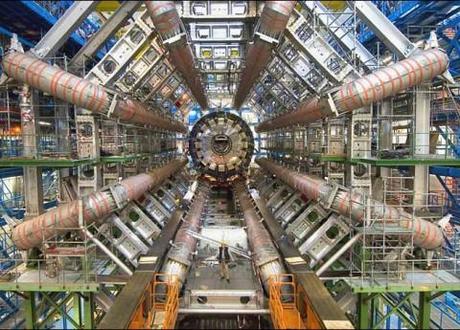 The Large Hadron Collider at Cern Photocredit: Image Editor http://flic.kr/p/47Psud
The Large Hadron Collider at Cern Photocredit: Image Editor http://flic.kr/p/47Psud
The background
Scientists announced the discovery of the Higgs boson, the so-called “God particle” that gives everything mass, this week – well, they announced the discovery of something that is very like it, and has all its properties. What was theorised fifty years ago by Professor Peter Higgs of the University of Edinburgh now has become fact. He speculated that an invisible background field (the Higgs field) permeated empty space, and that elementary particles, interacting with this field, were thus given mass. This in turn explains why atoms and molecules come together – eventually forming everything in the universe. Watch a professor explaining it with ping pong balls to a slightly embarrassed BBC presenter below.
At CERN, the laboratory in Geneva where the Large Hadron Collider smashes beams of particles into each other over miles of tunnels at 99.9999991 per cent of the speed of light, scientists found something that is consistent with the general predictions of the Standard Model. The existing data is still too small to confirm whether the particle is actually the Higgs boson, but it’s nigh on close. It only exists for about a trillionth of a trillionth of a second and has to be observed by its effects. Commentators are singing the praises of the thousands of scientists from all nations who have worked together on this momentous enterprise. Oh, and it’s lost Stephen Hawking $100 – he bet the results would be different.
“The Higgs boson walks into a Catholic church, and the priest says: ‘What are you doing here?’ The Higgs says: ‘Well, you can’t have mass without me.’” Quoted by Robert Colvile on The Daily Telegraph
We will know more about the nature of the universe
Lawrence Krauss on Slate said that this “cautious approach” as good as it means that it might point in the right direction to explaining mysteries about the universe. This discovery is “fundamental” in our “understanding of nature”, since the standard model “leaves open more questions than it answers.” Wat caused the Higgs field? Do other forces determine it? Also, the “Higgs field implies that otherwise seemingly empty space is much richer and weirder than we could have imagined.”
The scientists’ shabbiness is endearing
What a shame, said Robert Colvile on The Daily Telegraph, that the scientists announced this “epoch-making” event with the ludicrous Comic Sans font, which “rather undercut the majesty of the occasion.” However, the “pervading shabbiness” of Cern is “reassuring.” It shows that the scientists are focusing on “well, science.” In our age, this is very refreshing.
“I would like to add my congratulations to everyone involved in this achievement. It’s really an incredible thing that it’s happened in my lifetime,” said Professor Higgs, quoted on The Telegraph.
It confirms a theory, and will have practical applications
To most of us, said an editorial in The Times, it isn’t obvious why we should be so exciting. Curiosity is “demanding and oddly thankless.” The Higgs boson doesn’t “change everything,” but confirms a theory. It’s a “vindication of the scientific method,” and of the massive state investment. Only nations, “working together”, had the clout and funding to build the LHC. Sure, the practical applications might not be “obvious”. Uses “will be found”, though – and there will be “spin-offs of immediate and practical use.” And now “it is no longer a mystery why we exist as we do. Now we know.”
Goddamn particle helps us understand the universe
We can thank, said an Independent editorial, Leon Lederman for the particle’s nickname, the “God particle.” Interestingly, he initially wanted to call it the “Goddamn particle”, because of its “elusiveness”, but his publishers rejected it. Maybe we should now revive the name – “and so celebrate its true role in advancing understanding of the universe.”
If you ask one more time we’re not stopping at Burger King
Tim Dowling in The Guardian explained how to explain (polyptoton) the Higgs boson to a child: ““It’s a particle that some scientists have been looking for. Because they knew that without it the universe would be impossible. Because without it, the other particles in the universe wouldn’t have mass. Because they would all continue to travel at the speed of light, just like photons do. Because I just said they would, and if you ask ‘Why?’ one more time we’re not stopping at Burger King.”
See the explanation below – overenthusiastic professor, embarrassed presenter, ping pong balls and sugar

